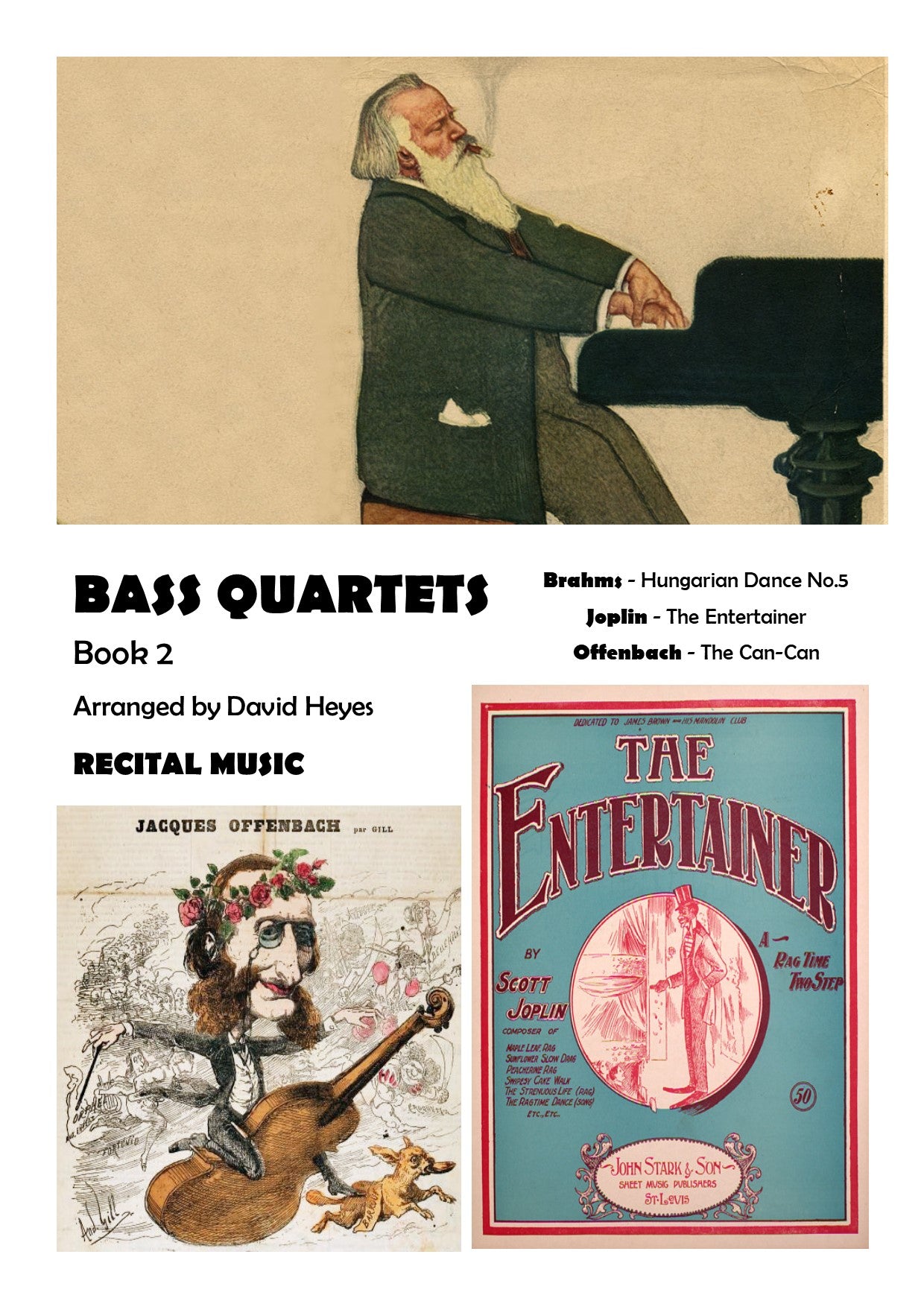David Heyes
Bass Quartets Book 2 - music by Brahms, Joplin & Offenbach for double bass quartet (arranged by David Heyes)
Bass Quartets Book 2 - music by Brahms, Joplin & Offenbach for double bass quartet (arranged by David Heyes)
Couldn't load pickup availability
About the Quartets
Johannes Brahms Hungarian Dance No.5
Johannes Brahms (1833-1897) composed 21 Hungarian Dances for piano (four hands), published in two sets in 1869 and 1880, some of which he later arranged for orchestra. They make use of the popular gypsy (Roma) musical styles which influenced many 19th-century composers and the dances are mainly fast and energetic.
Hungarian Dance No.5, originally in F sharp minor but transposed into G minor for orchestra, is probably the most famous of the set and was quickly arranged for many instrumental ensembles including violin or cello and piano, string orchestra, brass quintet, recorder quartet, wind band, and even 15 saxophones, percussion and piano.
This new arrangement for double bass quartet was created by David Heyes for his students at Wells Cathedral in Somerset. In the key of G minor, the music suits the bass quartet medium well with effective musical and technical challenges for each player. Basses 1 and 2 share most of the melodic material and this is a fun piece that would be ideal as an encore or the final work in a recital.
Hungarian Dance No.5 is aimed at the intermediate-advanced quartet and is a sure-fire hit with players and audiences alike.
Scott Joplin, The Entertainer
The Entertainer is one of Scott Joplin's most popular ragtime works and is a fun, lively and energetic piece which would be ideal as an encore for the adventurous intermediate double bass quartet. There are effective musical and technical challenges for each player, but nothing too taxing, and it has been popular with players and audiences alike. "The parts are well written and the main tunes are nicely distributed throughout the quartet. David Heyes has done an admirable job on this arrangement of a popular crowd pleaser, especially as the tune is not ideally suited to the double bass." (Bass News)
Scott Joplin, the "King of Ragtime" music, was born near Linden, Texas on November 24, 1868 and moved with his family to Texarkana at the age of about seven. Even at this early age, Joplin demonstrated his extraordinary talent for music. Encouraged by his parents, he was already proficient on the banjo, and was beginning to play the piano and by the age of eleven, and taught by Julius Weiss, he was studying musical theory.
After several years as pianist, playing in saloons and brothels throughout the Midwest, he settled in St. Louis around 1890. There he studied and led in the development of ragtime - a blend of European classical styles combined with African American harmony and rhythm.
In the late 1890s, Joplin worked at the Maple Leaf Club in Sedalia, which provided the title for one of his best known compositions, the Maple Leaf Rag, published in 1899. This was followed a few years later by The Entertainer.
In 1911, Joplin moved to New York City, where he devoted his energies to the production of his opera Treemonisha, the first ragtime opera. He managed to organise a performance in 1915, but without scenery or orchestra, but this was not successful and affected his morale and health greatly. In 1916 he was admitted to the Manhattan State Hospital and died there on 1 April 1917.
Jacques Offenbach The Can-Can
Not one for the purists! The Can-Can transcribes well for the intermediate double bass quartet and is a lively and upbeat addition to the transcription repertoire. It evokes the gaiety and joie de vivre of 19th-century Parisian life and is always popular with audiences.
The melodic interest is shared between the players and there is great scope for fun and enjoyment. Ideal as an encore or the final piece in a concert, this has been a constant best-seller since publication and is now available as a pdf download.
Although arranged for quartet, it has also been successfully performed with larger forces.
Jacques Offenbach (1819-1880) was a German-born French composer and cellist and composed almost 100 operettas. He was significant on later operetta composers, such as Johann Strauss II and Arthur Sullivan, and many of his stage works are still in the repertory into the 21st-century.
The Galop Infernal is from Orpheus in the Underworld, composed in 1858 and revised in 1874, and was Offenbach’s first full opera. At the end of the 19th-century it became one of the world's most famous pieces of music when the Moulin Rouge and the Folies Bergère adopted it as the regular music for their can-can. The Galop is now better known as The Can-Can.



